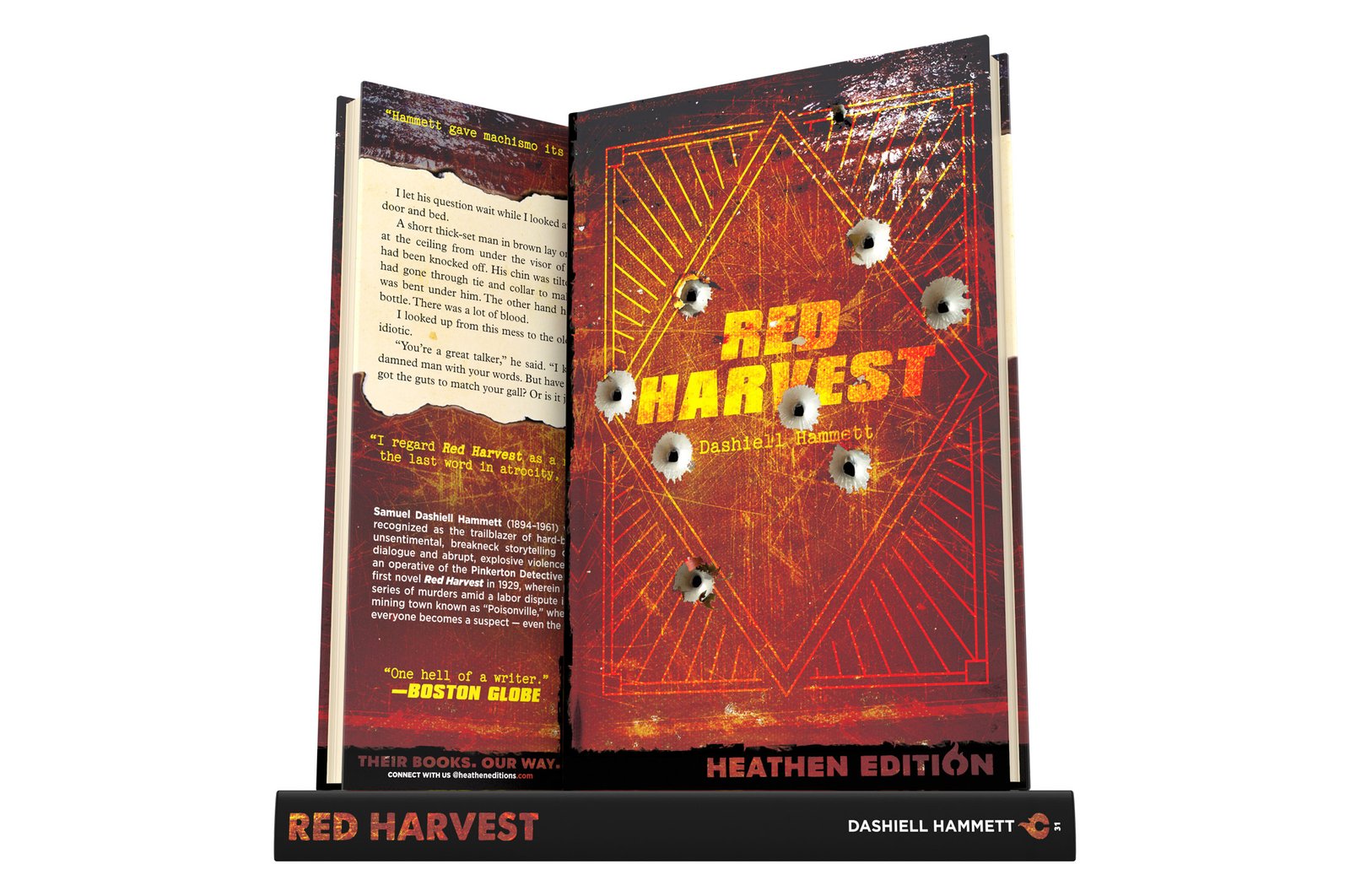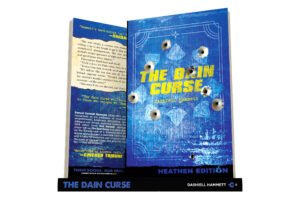No products in the cart.

Red Harvest
Spine #31
Author
Dashiell Hammett
Translator
First Edition
February 1, 1929
Heathen Edition
May 1, 2025
Refreshed
Pages
232
Heathen Genera
Wise Guys, eh?
Paperback ISBN
978-1-948316-31-6
Hardcover ISBN
978-1-963228-31-1
I let his question wait while I looked at the corpse on the floor between door and bed.
A short thick-set man in brown lay on his back with dead eyes staring at the ceiling from under the visor of a gray cap. A piece of his jaw had been knocked off. His chin was tilted to show where another bullet had gone through tie and collar to make a hole in his neck. One arm was bent under him. The other hand held a blackjack as big as a milk bottle. There was a lot of blood.
I looked up from this mess to the old man. His grin was vicious and idiotic.
“You’re a great talker,” he said. “I know that. A two-fisted, you-be-damned man with your words. But have you got anything else? Have you got the guts to match your gall? Or is it just the language you’ve got?”
Samuel Dashiell Hammett (1894–1961) was an American author widely recognized as the trailblazer of hard-boiled detective fiction with his unsentimental, breakneck storytelling chock-full of fast-paced, slangy dialogue and abrupt, explosive violence. Mining his own experiences as an operative of the Pinkerton Detective Agency, Hammett published his first novel Red Harvest in 1929, wherein his Continental Op investigates a series of murders amid a labor dispute in Personville, a corrupt Montana mining town known as “Poisonville,” where no one should be trusted, and everyone becomes a suspect — even the Continental Op himself.
Test Your Might
Paperback
OTHER RETAILERS
Rate & Shelve It
Hardcover
OTHER RETAILERS
Rate & Shelve It
"The dean of the ‘hard-boiled’ school of detective fiction."
The New York Times
Heathenry
Contents
Praise
Details
Heathenry
I wish someone would have jammed this book in my hands twenty years ago and said, “Shut up, read this, right now.”
It’s so good. I am biased, though, as hard-boiled/detective/noir fiction is one of my favorite genres, but what Hammett does, here, in Red Harvest is absolutely mesmerizing.
I am reminded of a quote from Leigh Brackett (which can be found in the “Heathenry” of our Stark Trio) — “I put myself through an intensive course of studying Steinbeck, Hemingway, Kipling, Chandler, and Dashiell Hammett because they got so much into so little” — because she’s exactly right: Hammett crams so much of everything into so little: plot, exposition, subtext, story, character… all of it, in lean, mean, short staccato sentences that punch like an underdog gunning for a title. Of Brackett’s work I said, “…her dialogue sizzles and pops like a string of lit firecrackers,” and it’s no mystery where she learned it: Hammett was a master of those lit firecrackers.
Which reminds me, I recently watched the Coen brothers’ Miller’s Crossing for the first time and it’s amazing how much they borrowed from Red Harvest. My favorite being their elevating Hammett’s one-off line “What’s the rumpus?” to near pseudo-refrain in their work. If you ever see me IRL, please greet me that way.
Zooming out: In so much of film and literature, I can now see Hammett as a nexus, a nucleus, a core from which all of noir and detective fiction has sprung. When one looks at his enduring legacy, it’s mind-boggling to think Hammett only wrote five novels, and in as many years. Cliché as it may be, the Taoist proverb attributed to Lao Tzu which observes, “the flame that burns twice as bright burns half as long,” surely applies, because my — how the Hammett flame burned!
Beyond that, what more can I say about Hammett that hasn’t already been said by someone somewhere?
Now, as for the text, we’ve applied our usual Heathening by modernizing a few hyphened words: good-night is now goodnight, shake-down has rightly become shakedown, and bulls-eye is more precisely bullseye, et al.
Additionally, we’ve included 116 footnotes to provide clarity, context, and commentary as necessary, especially due to the sheer number of slang terms that Hammett peppers scattershot throughout the story.
Finally, if this is your first time reading Hammett and you find yourself midway through the story and still unsure what all the Hammett fuss is about, then just wait for the ice pick.
The ice pick changes everything…
Sheridan Cleland
Co-Heathen
April 2025
P.S. If it’s not already available when you read this, Hammett’s sophomore shoot-’em-up The Dain Curse will be available as a Heathen Edition before you can say Jack Robinson. And you can bet your sweet bippy that his third The Maltese Falcon will be following in two shakes!
Contents
Heathenry: Thoughts on the Text
Red Harvest
Red Harvest
Praise
“An acknowledged literary landmark.” —Robert Graves, The New York Times Book Review
“The dean of the ‘hard-boiled’ school of detective fiction.” —The New York Times
“Hammett is an original. He is a master of the detective novel, yes, but also one hell of a writer.” —The Boston Globe
“I regard Red Harvest as a remarkable achievement, the last word in atrocity, cynicism, and horror. Dashiell Hammett’s dialogues, in which every character is trying to deceive all the others and in which the truth slowly becomes visible through a fog of deception, can be compared only with the best in Hemingway.” —André Gide
“Nobody else ever did it quite like this, and no one has done it since.” —The Times Literary Supplement
“Hammett was spare, frugal, hard-boiled, but he did over and over what only the best writers can ever do at all. He wrote scenes that seemed never to have been written before.” —Raymond Chandler
“. . . the ideal detective story—the new type of detective fiction . . . written by a master of his craft.” —Black Mask
“As a novelist of realistic intrigue, Hammett was unsurpassed in his own or any time.” —Ross Macdonald
“Though less famous than The Maltese Falcon or The Thin Man . . . this tale of omnidirectional treachery is the man at his deadly best. With the Continental Op, a detective he had been developing for years in short stories, Hammett created the prototype for every sleuth who would ever be called ‘hard-boiled.’ And with his witty, economical prose Hammett gave machismo its own terse lyricism.” —Time
Details
Red Harvest
Heathen Edition #31Published: May 1, 2025
Format: Paperback
Interior: Black & White on Cream Paper
Pages: 232 (+2 POD)
Language: English
Annotations: 116 Footnotes
Illustrations: 4
@heatheneditions #heathenedition
Copyright © 2025 Heathen Creative, LLC. All rights reserved.

